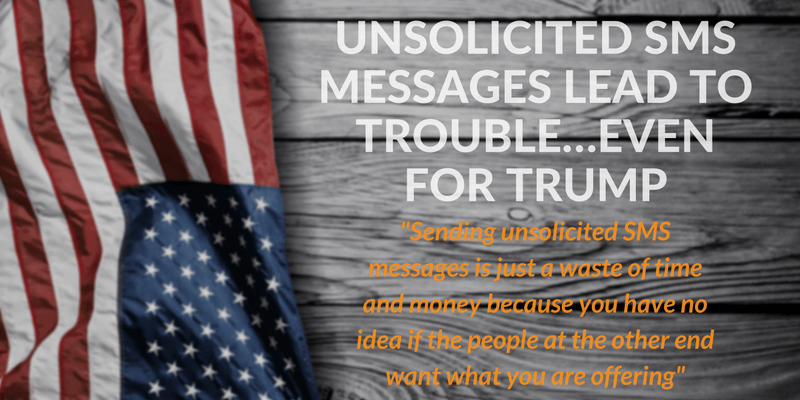Why You Need a Blacklist and What It Can Teach You

One of the major metrics in SMS marketing is how many people opt in to receive your messages. But there’s a flip side to that metric: how many people opt out. In the ideal world, no one would ever leave your list and instead continue to make purchases or support your organisation for as long as you decide to message them. But that is not realistic and so you need a blacklist.
But in reality there are always some people who, for whatever reason, no longer want to get text messages from you. And when they do you need to remove their number from your marketing list. This usually means placing their number on the “blacklist”, or list of numbers you never want to contact again. I put the emphasis on the never because if you contact someone after they’ve opted out there are potential legal issues and fines you could have to pay. If someone wants out, let them out and do everything you can to make sure you don’t contact them again.
In our web based SMS service, you can set it up so that anyone who replies with your opt out keyword is automatically added to the blacklist. Then every campaign you send from then on can be cleaned against the blacklist to ensure those numbers aren’t accidentally contacted again. It provides a peace of mind when sending marketing messages that also saves you a ton of time trying to clean your list manually.
But the value of your blacklist goes beyond just saving you from fines. In fact, you can learn a lot from your blacklist.
While it’s a broad brush across all industries, average opt out percentages are usually less than 5%. So hopefully your analytics show that to be true. If your rate is much higher than that though, you’re doing something wrong.
Take a look at the campaign you sent that generated those opt outs. Then ask yourself the following questions:
Did you send too many messages? No one likes to be nagged. If you promised not to send more than four messages a month, make sure you didn’t send more than four. Or perhaps you sent a message every day letting them know about the sale and offering a coupon code. If people opted out in an exodus after that, you know now that your demographic has a low tolerance for daily messages. So if you’d increased your message frequency just before the larger number of opt outs, rethink your messaging strategy.
Did you send at the wrong time of day or week? If your messages are arriving during off hours they could easily annoy people enough to have them opt out. Double check when the campaign’s messages were sent and received then adjust future messages to be at more appropriate times. Another point to keep in mind is a study that showed messages received on weekends are 5 times more likely to result in an opt out than one received during the week. The study was across all types of marketing and industries so there will be exceptions, but it’s worth considering whether your messages could wait to be sent on a weekday.
Are your offers relevant? Look at the offer you sent with a fresh eye. Did you offer something different than you usually do? Perhaps your customers aren’t interested in the type of offering you sent in that campaign. Or it may have been the final message in a string of irrelevant offers that finally pushed people to opt out. You’ll never know unless you can take a step back and see what the data is telling you.
Ah the glorious blacklist! It’s more than housekeeping, and more than a metric to show how “badly” your campaign went. It’s a true source of valuable information, if you only take the time to look at it. You can also learn more from our free Mobile Marketing Guide.
Related Articles
A Demonstration on How Not to Build Your SMS List
Over the last month or so I've signed up for quite a lot of webinars. I'm always trying to learn more about technology, marketing, best practices – you get the idea. So I've been excited to see many organisations offering SMS reminders for webinars. But there is one experience I had with an SMS reminder for a webinar that I simply had to share.
Why You Need a Blacklist and What It Can Teach You
One of the major metrics in SMS marketing is how many people opt in to receive your messages. But there’s a flip side to that metric: how many people opt out. In the ideal world, no one would ever leave your list and instead continue to make purchases or support your organisation for as long as you decide to message them.
Can You Send Anyone a Text Message?
Can you send SMS messages to whoever you like whenever you like? If that's what you believe read this article which explains what restrictions apply to broadcast messaging, what is the best way to build a permission based SMS marketing list. Understand that and you can safely make a start.
Unsolicited SMS Messages Lead to Trouble…Even for Trump
Late last month reports surfaced that the Trump US presidential campaign had sent unsolicited SMS messages to voters in the Chicago area. One man, Joshua Thorne, and his lawyers have filed a class-action lawsuit alleging the Trump Campaign violated the Telephone Consumer Protection Act (TCPA, the US equivalent of the PECR).
A review of the EC directive for SMS marketing
5 Ways To Ensure Your SMS Marketing is GDPR Compliant – [Infographic]
Never Use SMS Marketing the Way This Company Did
You’d think a large, multinational company would have all the resources and planning it needed to run an SMS marketing campaign. But that isn’t always the case apparently. Find out the big mistake this one company made and how you can avoid doing the same thing in this blog.
3 Reasons Why Enterprises Shouldn’t Build Their Own SMS Gateways
Enterprises are large companies. Sometimes that means they think they should be able to do everything themselves. But when it comes to SMS messaging, building an in-house gateway is more difficult than you might think. Read why finding a good SMS service provider is a better option.








![SMS Marketing GDPR Compliance [Infographic]](https://dox4euoyzny9u.cloudfront.net/images/fastsms/SMS-Marketing-GDPR.png)


